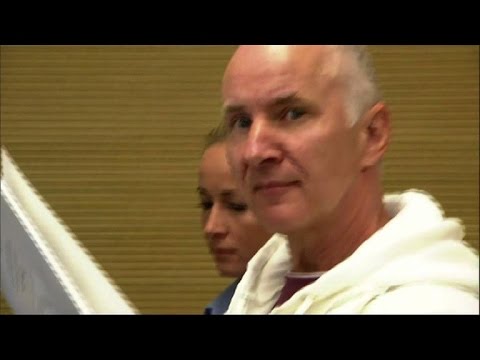10 Albert Jackson
In the 1960s, dry cleaning business owner Albert Jackson, who lived in Johannesburg, South Africa, was known for being a good family man to his wife, Lorna, and his two children. Unfortunately, Albert was deeply in debt, and there was only one solution to the problem—his life insurance policy. But in order to claim it, Albert needed to die, and it definitely couldn’t be a suicide. The next steps in the plan are a bit hazy, and it is unclear if Albert, Lorna, or both did the asking, but they approached an employee named Bennie Esterhuizen and asked him if he would kill Albert for money. Esterhuizen agreed to the plan, but he didn’t want to do the actual killing. Instead, he hired his friend Quentin Robinson for the dirty work. On May 25, 1964, Albert drove Robinson out to one of the roughest neighborhoods in Johannesburg. Once there, Albert told Robinson to go through with killing him, no matter what. Robinson pointed the gun at Albert’s left temple, but then Albert told him he didn’t think he could go through with it. Remembering what Albert said earlier, Robinson shot him once and left him in his car. Over a month after Jackson was killed, Robinson was arrested because he had a mistress who was of mixed race, which was illegal in Johannesburg at the time. From jail, Jackson wrote to the girl, asking her to give him an alibi for the time of Jackson’s murder, but the police intercepted the letter. They confronted Robinson, and he confessed to the shooting. Robinson also implicated Esterhuizen, who was paying a lot of attention to Jackson’s widow at the time. It is unclear how much Lorna was involved with the conspiracy, but she, Robinson, and Esterhuizen were all arrested and convicted of the murder. Each were given death sentences, but they were later commuted to prison time.
9 Chelsea Martinez
On August 1, 2015, 26-year-old Chelsea Martinez’s husband reported her missing from her Columbus, Ohio, home. When he searched her profile on a social website called Experience Project, he first noticed that she spent most of her time on a forum about Twilight. Then, he learned that his wife had been having a disturbing conversation with a user named “DarkRyd3r.” She had talked about how she couldn’t wait to die but was afraid to. She and the man talked about how he would kill her. Then she said that she would finally be at peace, and she thanked him. Watch this video on YouTube The police located her car near a park in Minnesota, over 1,100 km (700 mi) from her home. The police also uncovered the real identity of DarkRyd3r. He was 39-year-old Jason Nisbit of Faribault, Minnesota. According to court documents, Martinez, who was a mother of three, drove to a motel in Faribault on July 31 (about an 11.5-hour drive according to Google Maps), and Nisbit met her there. The next day, they drove separately to a park and walked into a wooded area. Once in a sufficiently secluded spot, Nisbit tied up Martinez’s hands and feet with a cord and then strangled her using another one. When she was unconscious, Nisbit slit her throat with a 25-centimeter (10 in) knife. He then dragged her to a culvert and partially buried her body. When the police tracked him down, Nisbit took them to the body. Martinez’s family said she had a history of mental issues and had been suicidal in the past. Nisbit is currently awaiting trial on second-degree murder charges.
8 Graham Glickfeld
For most of his life, Graham Glickfeld was a bit of an outsider due to his Tourette’s syndrome. He was bullied in school because of his ticks, and he couldn’t hold down a job as an adult. One place where Glickfeld felt at home was working on summer theater productions at Ohlone College in Fremont, California. That is where he met Michael Doeschot, and the two were friends for over 10 years. Sadly, their friendship came to a tragic end on December 22, 1989. On that night, Glickfeld and Doeschot left a Christmas party in Doeschot’s small car. Just before midnight, police were called to a community center parking lot. Glickfeld had been run over by a car, and he died in the hospital. Shortly after Glickfeld died, Doeschot called the police and admitted to killing his friend. He said that Glickfeld wanted to die and even paid him $200 to kill him. The police interviewed Glickfeld’s friends and family, and they said he had made this offer to other people. Everyone just wrote it off as a morbid joke, owing to Glickfeld’s unusual sense of humor. Doeschot was charged with first-degree murder, but no reports of his trial could be found.
7 Robert Levy
On April 6, 1996, the body of 27-year-old theater producer Robert Levy was found in sand dunes in the Florida Everglades. After the news was made public, the girlfriend of 21-year-old Christopher Murray called the police. Murray had told her that he had killed someone, and before the finding of the body was made public, she drove him to the area where the body was found. There, Murray retrieved the murder weapon—a leather belt. Murray was arrested, and he admitted to strangling Levy to death. But Murray, who was a male prostitute, said that it wasn’t murder. Levy claimed it was assisted suicide. He said that Levy, who was HIV-positive, had a death wish, and he had extremely dark sadomasochistic fantasies. As proof, Murray pointed to an incident in August 1994. After meeting at a bar, the two had driven out to the Everglades where Murray bound and beat Levy, breaking his ribs and his pinkie. Murray was paid $200 for the assault. At the time, Levy made a police record of the incident, but didn’t reveal that it was Murray who hurt him. Another time, Levy paid Murray $600 to carve the word “pig” into his back. When the police interviewed Levy’s friends, they said that Murray’s story was quite likely. Levy did have an incredibly dark fantasy life, and he had offered other people money to either maim or kill him. Murray pleaded guilty to second-degree murder, and he was given a seven-year sentence.
6 Jeffrey Locker
On July 16, 2009, 53-year-old Jeffrey Locker, father of three, was found dead in his car in front of a housing project in East Harlem, New York. Locker, who was a motivational speaker, had been stabbed seven times in the chest, and his ATM card was gone. On the surface, Locker’s murder looked like a run-of-the-mill murder-robbery where the victim was in the wrong place at the wrong time. Tracking down the killer wasn’t too difficult. The ATM card was used five times at five different locations. The police got the surveillance footage and identified the person who withdrew $1,100 as Kenneth Minor, a 36-year-old ex-convict. Minor was brought in for questioning, and he admitted to the stabbing but claimed that he wasn’t the one who planned the murder. According to Minor, Locker came up to him one day on a street corner in East Harlem looking for a gun, so Minor asked him why he wanted one. Locker said, “because I want you to shoot me.” According to Minor, Locker wanted to be murdered so that his family would get millions of dollars in life insurance money. On the fateful night, Minor got into Locker’s car, but he didn’t have a gun because he couldn’t track one down. He tried to strangle Minor with telephone wire, but it broke. Then, according to Minor, Locker got a knife out of the glove compartment, held it against the steering wheel, and stabbed himself by lunging forward. Then Minor moved the knife over Locker’s heart, and Locker apparently repeatedly lunged toward the knife. Minor left Locker bleeding in his car and then hit up the ATMs, using the PIN number that Locker gave him. At first, the police didn’t believe Minor, but he stuck to his story that Locker wanted him to do a “Kevorkian” on him. Nevertheless, the police looked into Minor’s claims, and it turned out that Locker was swimming in debt, and he did have a huge life insurance policy. which he had just taken out. Then, another man with a similar story to Minor’s came forward. He told the police that he drove around with Locker, looking for a good place to be murdered, but he just conned Locker out of some money and left him alive. In 2011, Minor was found guilty and given 20 years in prison. That conviction was overturned, and in October 2014, Minor accepted a plea deal for a 12-year prison sentence. As for the Locker family, the insurance company asked the courts for the $4 million policy to be voided because Locker lied about how much money he made and how much debt he was in, and he didn’t cancel another life insurance policy. The judge agreed, and the policy was canceled. The insurance company returned any payments that Locker made on the policy to his family.
5 Susan Potempa
In 1993, Robert Potempa and his son were returning to their home in Summit, Illinois, after a weekend away for an out-of-town Thanksgiving football game. Once home, they found something awful. Fifty-year-old Susan Potempa, Robert’s wife and his son’s mother, was dead in the garage. She had been strangled and beaten with an electrical drill. When police investigated the seemingly random act of violence, an unusual story started to emerge. A year before her death, Potempa was diagnosed with breast cancer, and doctors performed a mastectomy, which left her in an incredible amount of pain. She apparently had asked four separate men in the neighborhood if they could somehow arrange her murder. She wanted to die, but if she committed suicide, her life insurance policy wouldn’t pay out. None of the men were interested. Then, a witness came forward and told police that his friend, 18-year-old Reginald Williams, had admitted to the murder. The police had the friend record a conversation about the murder with Williams, who was then arrested. According to Williams, on Thanksgiving night, Potempa picked him up and drove him back to her home. There, Williams strangled her until she lost consciousness, took the $2,100 that was set aside for him, and left. However, Potempa wasn’t dead. Once she came to, she tracked down Williams, and they returned to the house. This time, Potempa said to get her unconscious first, and then Williams could do anything to her, just as long as it killed her. So Williams stood behind her and wrapped his arm around her neck until she lost consciousness. He then hit her seven or eight times with the electric drill, and Potempa finally died. Williams was convicted for Potempa’s death, and he was given 26 years in prison in February 1996.
4 Rodrigo Rosenberg Marzano
On May 10, 2009, 48-year-old lawyer Rodrigo Rosenberg was cycling in Guatemala City when he was shot in the chest, neck, and head. At his funeral, a longtime friend of Rosenberg said that before he was killed, Rosenberg recorded a video that should be viewed in the event of his murder. The video, which was available on CD at the funeral, was 18 minutes long, and in it, Rosenberg said that if he was killed, Guatemalan president Alvaro Colom and other top officials were involved in the murder. Rosenberg said that he was assassinated over his investigation regarding the death of two of his clients, Khalil Musa and his daughter, Marjorie. Musa was a Lebanese immigrant and rose out of poverty to become a very wealthy man in the fields of manufacturing textiles and coffee. On April 14, 2009, Marjorie was driving her elderly father to a factory when a gunman opened fire on the car, killing both passengers. Rosenberg, who had been in a long-term relationship with Marjorie, believed that President Colom was involved with the murder of the Musas. In the video, Rosenberg speculated that the president might kill him to silence him. Once the video hit YouTube, it caused political turmoil in Guatemala. But after an eight-month investigation by the United Nations, investigators concluded that Rosenberg actually set up his own assassination to frame the president. According to the investigation, in the weeks leading up to his death, Rosenberg had been depressed over a messy divorce, the death of his mother, and the murders of the Musas. Looking to kill himself and get revenge on the president, who he believed was responsible for the Musas’ deaths, he had two of his ex-wife’s cousins arrange the murder, but they did not know that the target of the hit was Rosenberg himself. The suicide by assassination led to 10 gang members being charged and convicted. The cousins who set up the hit are currently awaiting trial.
3 Tashina Rae Sutherland
On the night of April 25, 2012, 25-year-old Jessica Ashley Hanley invited her best friend, Tashina Rae Sutherland, 22, over to do a little partying at her boyfriend’s home in Surrey, British Columbia. The two friends drank and did cocaine all night and into the next day. The next afternoon, according to Hanley, Sutherland wanted to make a suicide pact, but Hanley didn’t want to go through with it. This only seemed to make Sutherland angry, and she thought that Hanley had wimped out. So in compliance with her best friend’s wishes, Hanley stabbed Sutherland 41 times in the abdomen, chest, back, neck, and head with a boning knife and a bayonet. Once she was dead, Hanley dragged her by the ankles into the bathtub. As Hanley sat beside the bathtub and considered how she would dispose of the body, she sent texts to her boyfriend saying that she had killed Sutherland. The boyfriend came home and found the house in complete disarray, and Sutherland’s body was indeed in the bathtub. He told Hanley to get out of the house, and he called the police. After leaving the murder scene, Hanley went to see her father, who lived a short distance away. She admitted to him that she killed Sutherland, and he took her to the police station to turn herself in. Hanley pleaded guilty to manslaughter and was given a sentence of seven years and nine months. Sutherland had previously written a note to her family, asking them to look up at the sky and remember her on the day she died. She had apparently been planning her death before doing the cocaine.
2 Wojciech Stempniewicz
According to neighbors, 58-year-old businessman Wojciech Stempniewicz was a nice guy. However, the father of three grown children also harbored dark fantasies involving slaughter and cannibalism. He enjoyed visiting a message board dedicated to such fantasies, and there, he met 56-year-old German police officer Detlev Guenzel in October 2013. The two talked extensively online and over the phone, and this led to an in-person meeting a short time later. On November 4, 2013, Stempniewicz went to a bed-and-breakfast that Guenzel owned in the German town of Hartmannsdorf-Reichenau. It is unclear what exactly happened, but at some point, Stempniewicz ventured into Guenzel’s homemade dungeon in his basement. Stempniewicz, who was gagged and bound, apparently hung himself, and then Guenzel slit his throat. It’s unclear what exactly killed him. Guenzel originally admitted to slitting his throat, and Stempniewicz’s medical report said that asphyxiation was the probable cause of death, but the report was inconclusive because of the state of the body. During their investigation, police uncovered an email chain between Guenzel and Stempniewicz called “Schlachtfest,” which is the name for a German rural festival in which a pig is slaughtered. When the police looked into Guenzel as a suspect, they found that he had made a video of himself cutting the body into pieces with a knife and an electric saw. In the video, which was shown to jurors at his trial, Guenzel is heard saying, “I never thought I would sink so low.” After the body was dissected, Guenzel buried the pieces in his garden. There is no evidence that Guenzel cannibalized any of Stempniewicz’s flesh, but some parts of the body were never found. Guenzel was convicted of the murder, and he was given eight and a half years in prison. Of course, this isn’t the first time that Germany has seen a case of someone agreeing to be killed and eaten. In 2001, Armin Meiwes murdered and ate Bernd Juergen Brandes, a willing participant. Meiwes is currently serving a life sentence.
1 Dagmar, Marina, And Petra Alexander
Shortly after being born in 1954 to Harald and Dagmar Alexander, Frank Alexander was proclaimed a prophet of God by his father, an extremely religious zealot. And as a prophet of God, every command that Frank made had to be obeyed by everyone in the family, which included his older sister Marina and his younger twin sisters, Sabine and Petra. As Frank became a teenager, he decided that having sex with females outside of the family would make him unclean. He announced he was only going to have sex with his sisters and mother, and they all agreed because it was their way of serving God. The police in Hamburg, Germany, where the family lived, heard about the rumors, but when an investigation was launched, the Alexanders moved to the Canary Islands for more privacy. While living there, the family kept to themselves, and the neighbors didn’t see much of them. The only thing they heard was an organ being played at all hours of the day. On December 22, 1970, a doctor came home to his villa and found Sabine, who was 15 at the time and worked there, making a meal in the kitchen. Sabine took him to the patio where Frank, now 16, and Harald were resting. Both were covered in a dark substance that the doctor thought was dirt. Upon seeing his daughter, Harald said, “Sabine, dear, we want you to know at once that Frank and I have just finished killing your mother and sisters.” Instead of being mortified, Sabine took her father’s bloodstained hand, put it to her cheek, and said, “I’m sure you’ve done what was necessary.” When Harald noticed that the doctor was there, he addressed him and again admitted that he and Frank killed his 39-year-old wife, 18-year-old Marina, and 15-year-old Petra. That’s when the doctor realized that what he thought was mud and dirt on the two men was actually blood. The doctor told the living family members to wait at the villa while he called the police. When officers arrived at the apartment, they came across a scene that would make most people’s nightmares look tame. Everything was covered in blood. There was blood on the ceiling, the walls, and the floor. In the middle of the living room were the bodies of Marina and Petra. Both had their breasts and genitals removed; they were found nailed to a wall. Marina had also been disemboweled. In the bedroom, Dagmar was also dead. Like her daughters, Dagmar’s breasts and genitals were cut off. Dagmar’s heart was also cut out. A cord was tied around it, and it was nailed to the wall. Frank and Harald were arrested, and at the police station, they freely talked about the bloodbath. Frank said that his mother was giving him a look he didn’t think was appropriate, so he beat her into unconsciousness with a clothes hanger. Understanding what was happening, Harald went to the organ and started playing while singing his praises to Jesus. Frank then went into the living room and beat Marina into unconsciousness and then did the same to Petra. Once they were unconscious, Frank started cutting up the bodies while his father continued to play the organ and sing. When Frank became tired he took his turn on the organ while Harald continued hacking up the bodies. Harald said that the women knew that the “hour of killing” could happen at any time. They also knew their role as a sacrifice in the “holy time,” and they had accepted this role because they were serving God. Neither men felt guilty for what they did because they sent the women to Heaven. Frank and Harald were found unfit to stand trial and were placed into an asylum. Sabine was sent to live in a convent where she presumably still lives. Robert Grimminck is a Canadian freelance writer. You can friend him on Facebook, follow him on Twitter or on Pinterest, and visit his website.
























